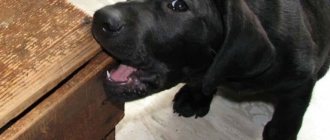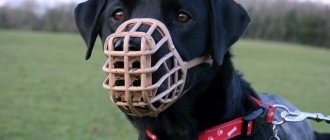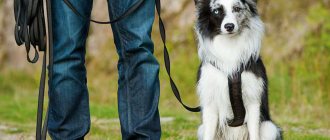Why do dogs start whining?
Whining is a problem that many dog breeders face.
There are several reasons why a dog starts whining:
- Expression of emotions. This is the only way a dog can express his emotions.
- Disease. Sometimes animals begin to howl due to diseases of internal organs or injuries.
- To attract attention. Some Labradors, Bulldogs, Beagles and Yorkies attract attention in this way and ask to be played with or taken for a walk.
- Loneliness. The dog often whines when left alone at home due to loneliness.
- Apology. There are times when a dog has done something wrong and feels guilty about it. In such cases, dogs often begin to whine, lower their eyes and press their ears.
Additional Information! Chihuahuas, Pomeranians, Terriers and Dachshunds may whine due to fear. In such cases, you need to try to calm the dog down.
The dog whines: reasons
The dog will not howl for no reason; such behavior may mean that the pet wants to say something to the owner. There are several most common cases, it is worth considering these situations in more detail.
Health problems
If whining occurs against the background of poor health, then in this way the dog is trying to show the owner that something is bothering him. Most often this is associated with the following pathologies:
- colds, for example, with otitis, the dog shakes and scratches the sore ear;
- problems in the musculoskeletal system manifest themselves in the form of groaning and are characterized by an abnormal gait;
- violation of defecation, in this case the number of bowel movements is reduced, the pet has hard feces, the stomach becomes large and dense;
- Gastrointestinal diseases in the form of vomiting, frequent bowel movements.
If you have even one of the symptoms, you should immediately visit a veterinary clinic. A specialist will identify the problem and fix it.
Whining can occur due to illness; the dog becomes sad, may go to a secluded place, and begins to twitch and tremble
Injuries
Howling can be caused by injuries in the oral cavity due to damaged gums. Or, alternatively, the dog may have damage on its paws.
Attention! Painful sensations and discomfort provoke whining. In this case, you need to carefully examine your pet for wounds.
Hypothermia
Often the dog begins to whine because of the cold, this happens especially often in winter. You can get rid of the problem by laying a bed for your pet on the floor, making a kind of bed. This is especially important for breeds such as:
- York;
- mini terrier;
- dachshund.
This way you won't have to wear them to your own bed at night. They will feel comfortable in their place.
Behavior driven by instincts
Whining can be caused by the hunting instincts of a four-legged friend. He may bark and howl loudly when he sees birds outside the window or a cat. The frustration of not being able to catch prey makes the pet whine.
Bad Education
If you don’t work with an animal, don’t explain to it what can be done and what is strictly prohibited, then it will grow up ill-mannered. Accordingly, the dog will bark at night, ask to go to the toilet at the wrong time, and spoil objects and things.
This is actually why it is so important to accustom a puppy and train it from an early age. Then he will not bother his owners with causeless whining.
Often whining is a simple manipulation, so owners should be careful
Pet's emotional state
Whining can be caused by joy, for example, when meeting the owner from work or after a long trip. Usually these emotions are temporary; after a while the pet will calm down on its own.
Depression and sadness
Another reason why an animal begins to behave strangely and emit a characteristic whining sound is depression. In this case, the dog may not find a place for itself.
Attention! It is necessary to analyze all the events that have occurred in the near future and try to avoid such situations in the future.
Fear
If your pet starts hiding and whining, then most likely he is afraid of something.
In this case, the dog must be desensitized by a specialist. You can also give her her favorite toy, which will distract her and relieve her of anxiety and fear.
During heat
Another reason why a dog whines is due to hormonal changes that occur monthly in bitches. Estrus can affect the behavior of a pet, this especially often happens with the onset of spring.
The hormones produced affect the nervous system, the female begins to make characteristic sounds calling for males. In this case, the owners need to wait it out; with the end of the heat, the dog will calm down on its own.
Communication method
In this case, whining arises as a way of communication. Thus, the dog is trying to attract attention to himself:
- asks for food;
- wants to play;
- requires a walk.
Also, a dog often uses characteristic sounds to show its attitude towards its owner and show respect. In this case, she can take the appropriate position: lie on her side or back.
Physical need
If a pet begins to whine and rush around, dig a hole and stand on its paws in front of its owner, most likely it wants to go to the toilet. In this case, dealing with barking is quite simple. You need to take the animal outside to relieve itself.
Whining for no reason
If the howling occurs for no apparent reason, then this is a cause for concern. Characteristic sounds cannot appear just like that. Often, owners simply cannot figure out the problem on their own.
It is necessary to take a closer look at your pet and observe it for some time: lameness indicates an illness or injury to the paws; with sore ears, the dog begins to tilt its head in the direction where the pain occurs; If the animal has a sore stomach or toothache, it refuses to eat.
Note! If you cannot identify the cause yourself, then you should consult a veterinarian, otherwise you may miss a serious illness.
Whining may occur due to the occurrence of some kind of disease
At night
At night, a dog's whining can be triggered by a fear of the dark; it cannot lie down and sleep normally. In addition, the animal is affected by the lunar phases, for example, during the full moon, pets behave especially restless and anxious. This condition causes howling.
You can get rid of the problem with the help of a sedative.
What to do if your puppy whines at night
Depression is one of the reasons why dogs start whining.
Most often, small dogs make unpleasant sounds at night after moving. Whining in the first days in a new place is normal. The dog is frightened by new surroundings, unknown smells and sounds. Many dog breeders advise in such cases to put the dog on the bed. However, experienced dog handlers do not advise doing this.
To stop your dog from whining while sleeping, you need to do the following:
- organize a comfortable place for your pet where he can rest;
- do not leave the dog alone for a long time;
- do not lock the animal in an enclosure;
- protect the puppy from stressful situations and negativity.
What if the dog whines in the absence of his owners and at night?
There may be several reasons why a puppy whines both during the day and at night.
- Adaptation to a new place and associated anxiety. A two-month-old puppy is a small, defenseless creature. He was accustomed to a familiar environment, the company of his mother, brothers and sisters, but suddenly he found himself torn away from them and placed in a new environment, where there were also unfamiliar creatures. How can you not worry? Often a puppy that finds itself in a new home whines at night, especially in the first days.
- Fear. Sometimes a puppy whines out of fear, for example, when he sees an unusual and frightening object. As a rule, in this case, the baby tucks his tail and tries to run away or cuddle up to the owner’s feet.
- Boredom. Sometimes a puppy whines during the day (and even sometimes at night) because he is simply bored. After all, before he had the opportunity to play with other puppies, but now he is all alone, especially if the new owners spend the whole day outside the house.
- Pain. Sometimes a puppy whines because he is in pain, for example, he jumped off the couch unsuccessfully, fell from a child’s arms, or was injured.
- Hunger. A hungry puppy will, of course, whine, because he feels serious discomfort.
- Reinforcement from the owner. If you pay little attention to the puppy, but immediately run to him as soon as he whines, the baby will very quickly learn to whine to attract your attention. In this case, it is the owners who teach the puppy to whine.
There are several theories as to why dogs whine in their sleep. The main reason is a vivid dream that causes an emotional outburst and manifests itself in the form of whining in reality. It is impossible to determine whether an animal is having a good or a bad dream, but they, like people, have dreams. This phenomenon is completely normal and should not cause concern.
Perhaps the pet experiences anxiety when the owner is not around, which is why the dog whines at night. If this behavior occurs repeatedly, it is advisable to move the dog bed into the bedroom and place it next to your bed. This measure is temporary. After some time, the bed needs to be moved a short distance towards the bedroom door, and then to the permanent location of the animal’s sleeping place.
Why does an adult animal whine for no apparent reason? Perhaps this is a manifestation of emotions (boredom, melancholy, fear, resentment, joy). Does your dog bark happily when you're alone at home? Perhaps she is simply playing in the absence of her owners. The pet is always attached to its owner and considers the owner's family to be its pack. When family members are away from home all day, they often go on business trips, the animal feels lonely and abandoned. The dog starts whining when left alone.
Some dogs even experience fear of their owner’s next departure, which intensifies at night. After the death of one of the family members, the animal will howl for a long time, sometimes 2–3 months. A whelped bitch sadly cries for her puppies, which were taken away from her, and asks the owner to return the babies to her. A dog whines even from simple boredom if it has nothing to do.
Asks for a treat
A cunning pet may whine pitifully, begging for a treat. This does not mean that the animal is hungry. It is quite full, it just wants to get something tasty. Such blackmail must be stopped immediately, otherwise the dog will quickly become spoiled and will constantly beg and beg for food. Treats—dog biscuits, etc.—should be a well-deserved reward, not the result of whining.
When a dog is bored alone and wants affection, it attracts attention by barking. You can call her over, pet her, scratch her behind the ear, or throw her a stick - perhaps the pet just wants to play and run around. A yard dog, if it lives in an enclosure, may ask to go for a walk by howling. It should be remembered that any animal requires attention and affection from the owner.
A dog whines if it feels physical discomfort. The dog howls or barks when he urgently needs to go outside to go to the toilet. Strong thirst causes the pet to whine and remind the owner that he needs to pour clean water into the dog's drinking bowl. Another reason could be hunger.
Sometimes an adult dog may whine at nightfall due to lack of physical activity, when the animal moves little and does not get tired at all. It is necessary to organize long walks, hikes in the forest, and outdoor games with a ball and a stick several times a week so that the pet gets plenty of exercise and is tired.
A healthy adult dog sleeps soundly at night. Puppies often make unpleasant sounds at night, which is associated with fear and a feeling of loneliness. You cannot shout at your pet, much less beat him for it, you need to calm the animal down and gradually accustom it to the dark. A person should be patient, calm, and should not be irritated by constant whining.
During the day, you should not leave your dog alone for a long time, much less lock it in a cage. It is necessary to accustom the dog to the commands “no”, “place” and, if they are carried out, reward them with a treat. In the future, these commands will help in the fight against obsessive howling or barking.
We suggest you read: Why does a neutered cat try to mount cats or objects?
The dog must be able to remain alone at home when the person goes about his business. An animal that whines and howls under the door causes a lot of trouble not only for its owner, but also for all the neighbors. What to do when your dog behaves restlessly, barks and disturbs others? Gradually you need to wean your pet from such hysterics. To teach him to be alone, you need to:
- leave the animal alone in one of the rooms of the apartment;
- if the dog scratches the door and whines, do not pay attention to it;
- as soon as the noise outside the door subsides, you should go into the room, praise your pet and leave again;
- repeat training regularly.
Over time, the dog will understand that silence is required of it and will get used to being alone. When leaving home, a dog left alone should leave her favorite toys and teeth sharpeners so that she has something to do.
A dog is, first and foremost, a pack animal by nature. If a young puppy begins to whine, bark or make some other sounds at night, this only indicates that in this way he attracts the attention of his relatives. He was used to sleeping near the warm body of the female who gave birth to him, and not being in splendid isolation, albeit on a bedding, but also in love. He may be scared and cold. It is easier to solve this problem by moving the puppy to the owner overnight.
You can also use the "fu" command. It must be pronounced quite firmly and confidently. The first time the dog does not always understand what they want from him, but by the third or fourth time he gradually stops making sounds. When this happens, you should definitely praise your pet for it.
The “fu” command shows that the owner is the boss in the house. From a young age, the dog needs to realize this. The animal is educated only by voice, and not by physical beatings. In this case, the animal can be psychologically traumatized.
Often, if a puppy whines at night, he receives little attention during the day. Often it is not possible to spend much time with him due to work or other matters, but it is still better to compensate for this shortcoming in some way. First of all, this concerns walks. If the puppy becomes physically developed and a little tired, he will need to pay less attention. As a result, he will have less reason to whine or make other sounds at night.
Proper nutrition should also be ensured. It must occur in accordance with the regime. This also applies to access to water when using dry food. This type of food dehydrates the body quite strongly, so the animal will always require the proper level of fluid. If it is not there, it will begin to make sounds or get nervous.
In addition, the puppy should always have his favorite toys and a teeth sharpener in his field of vision. They can help redirect his attention so that he stops whining.
It is important to understand that the effectiveness of all of the above methods can only be achieved with an integrated approach to raising your little pet. All the factors described above in one way or another affect his physical and psychological state. He should be as comfortable as possible with his owner, so that the thought of living with other animals does not even occur to him.
As a rule, adult dogs sleep at night if their day has been eventful and active, the pet is well-fed and healthy. Therefore, most often small puppies make cutting, unpleasant sounds at night, and this is most often explained not only by a sharp change in their usual environment, but also by fear and loneliness.
During the first few days, whining is quite normal. He is frightened by new surroundings, smells, sounds. Some dog breeders recommend taking your pet to the bed. But dog experts do not recommend doing this. The puppy will get used to sleeping with you and it will be difficult to accustom an older pet to a place.
To stop your puppy from whining:
- Organize a comfortable bed or house for the new member of your family.
- If possible, do not leave the dog alone for a long time, and especially do not lock the puppy in a crate or in another room.
- Protect your dog from stress and negative emotions. The period of adaptation and socialization should be as calm and favorable as possible.
If the puppy is a little over a month old, at this age it is not advisable to separate him from his mother. But if this happens, place the dog bed near your bed and as soon as the baby whines, calm him down and pet him. Once the puppy calms down, praise him.
Gradually move the lounger further away from the bed and react less to whining. Pay more attention to the pet so that it quickly gets used to its new home and can more easily endure separation from its mother. To help the puppy better tolerate separation from its mother-dog, ask the breeders for toys, a cloth, and things that retain familiar smells.
What not to do with a puppy
Many people, when they hear their pet starting to whine, immediately run to it. However, you really shouldn't do this. The dog needs to be given a little time to calm down. Only after this you need to approach him and wait until he starts to sleep.
Important! You should not raise your voice at a dog to calm it down. Any manifestation of aggression will only aggravate the situation and negatively affect the emotional state of the pet. You need to wean your dog off whining carefully and gradually.
Dog whines while in another room
Loneliness often leads to the fact that the dog begins to whine.
If the dog has already gotten used to the new home and owner, but still does not stop whining in another room, then you will have to train the pet. You cannot constantly reassure him and indulge this behavior.
Too soft an attitude can lead to whining becoming a habit and the dog will begin to howl for almost any reason.
We must try not to pay attention to the constant whining when the dog wakes up in another room. Over time, the dog will understand that such behavior does not produce any results and only causes negative emotions in the owners. If the dog is smart and well trained, it will understand everything and stop behaving that way.
How to stop a puppy from whining at night - 2 effective methods
Method 1 - Bring your dog into your bedroom for the first 2-3 weeks
Place a large, fairly tall pet basket next to your own bed (or buy a crate for your puppy to sleep in). Thanks to this, the dog will be close to you, but will not sleep in your bed.
Gradually, the puppy will begin to sleep better and better at night (after all, he feels safe with his owner). Then you can gradually increase the distance of the crate from your bed - so that the dog will eventually begin to be alone in another room and not whine.
Tip: place a bottle of hot water wrapped in a towel in the place where your pet will sleep - this will give your four-legged a feeling of closeness and help you fall asleep faster.
Method 2 - When you don't have room for a dog in your bedroom
This option addresses the situation where you have a large dog crate on, say, the main floor of the house (or in another room), but you don't have room for a large dog in the upstairs bedroom. The fact is that German Shepherd or Malamute puppies need a much larger crate than Chihuahua puppies. And some people have a rather small and cramped bedroom, in which there is simply no room for a four-legged one.
If you want your pet to start sleeping well and not whining at night, spend 3-5 days next to him in another room where his cage (kennel or something similar) is.
Yes, you will have to forget about your cozy bed for this time and spend these days in the living room (or wherever you decide to establish a place for the puppy). Yes, you will need to wake up every 2 hours and calm your dog down at night if he whines. But this is the only way you can get rid of the constant barking and squealing
at night.
On day 5, start going to your room as soon as your pet falls asleep. So, by the 2nd week he will get used to falling asleep without your presence, and the cozy atmosphere in the house will improve.
The dog starts whining when his owner is away
There are times when a pet begins to throw a tantrum if he has to sit at home alone. It is necessary to get rid of this problem gradually.
You should leave your dog alone in a locked room for a while. At first the animal will resist, but over time it will get used to it and feel comfortable. After the dog stops whining, you need to go to him and praise him.
Important! You need to leave your pet alone in the room several times until he gets used to it.
How to stop an adult dog from whining: advice from dog handlers
Encouragement helps wean your dog from whining.
There are several useful recommendations from dog trainers that will help wean your pet from whining:
- There is no need to scold the dog when it starts to whine while resting in its place. In this territory, the pet should feel confident and calm.
- During training, the dog should be rewarded with treats for following commands and good behavior. Praise encourages the dog to be more obedient.
- Animals need to be weaned off whining gradually. At the same time, you need to raise your pet correctly, without aggression.
- If necessary, puppies should be punished. Most often, punishments are effective on disobedient and spoiled animals.
Useful tips
There are some helpful tips that can help if your dog is squeaking or whining. They are as follows:
- Organize your pet’s own place and provide it with toys. If the problem lies in boredom, then the dog may occupy itself with play and the whining will stop on its own.
- Try to keep the puppy busy with things to do, then he will have no time left for other activities. It is worth spending more time walking, and the walking should be quite active. You can keep your dog busy with running, training, and playing. The more tired he gets, the more sound his sleep will be, and the desire to whine will completely disappear.
- It is worth planning the daily routine in such a way that the regime satisfies the dog’s physical activity. Active breeds must expend a lot of energy, otherwise the animal will behave badly, howl and damage property.
Note! During a move, renovation, or the birth of a child, you cannot ignore your pet; during this period, you should give it maximum attention and take care to avoid stress, as it can provoke causeless barking and night howling.
Why you shouldn't calm your dog down
Some dog breeders believe that when whining, it is necessary to immediately begin to calm the animal. In reality, such tactics are not always effective. Especially if the dog is more than six months old.
When understanding the question of how to stop a dog from whining, it is important to remember that if you constantly calm the dog down, he will begin to attract attention to himself more often with this very behavior. Therefore, it is necessary to combine incentives with stricter education. Only in this way will it be possible to achieve acceptable behavior in the dog.
If the animal itches
The animal itches and looks restless for the following reasons:
- Prolonged stress.
- Obvious mental disorders.
- Parasites.
- Allergy.
With obvious mental disorders, the dog scratches the skin until it bleeds. Quite often, you can observe your pet licking its front paws. When the dog is excited, he often and nervously licks his muzzle. Such conditions can be treated with long-term therapy, massage, changes in feeding and walking schedules, and increased attention from the owner.
Your dog may be itchy and anxious if he is infested with fleas, ticks, or other parasites. To protect your pet from unwanted “neighbors,” you need to carry out preventive measures once every 1–3 months, depending on the drug chosen.
The dog is nervous before traveling or in the car
Severe anxiety before traveling or in the car is a natural reaction of a dog. It is important to understand what a pet experiences if its trajectory of movement is not under control.
Note! Before and during travel, veterinarians recommend the use of sedatives.
Breathes frequently with mouth open
When a dog is anxious and frequently breathes with its mouth open, the reason is overexcitement or an increase in body temperature. Overexcitement does not always threaten the pet's health, since the dog can experience strong emotions of a positive nature.
The dog has its tail between its legs
If your dog is anxious and has a tucked tail, the most likely reason is:
- Self-doubt.
- Competitive environment.
- Physical pain that causes the dog to feel insecure.
A tucked tail can indicate distress or a willingness to submit. To determine the real reason, the dog's behavior must be analyzed comprehensively.
The dog hides in a secluded place
If the dog hides in a secluded place and looks worried, the reasons could be:
- Overworked.
- Ailments of any origin.
- Fear of the light.
Photophobia is a symptom of serious disorders in the central nervous system and one of the signs of rabies.
The dog is shaking all over
If the dog is shaking all over, it may have:
- Hypothermia.
- Overwork.
- Fever.
- Strong excitement.
Note that small breed dogs are prone to rapid agitation and tremors. The smaller the dog, the faster it freezes and can shiver even in the warm season.
The dog follows its owner
A dog that worries and follows its owner suffers either from its own anxiety or from the owner’s emotions.
It is important to understand that a dog can experience some events in your life much more emotionally. For example, if there is a quarrel in the house, the dog may chase the person it considers offended. This behavior is driven by basic instincts.
The pet refuses to eat or does not drink
A dog refuses to eat or does not drink, regardless of the reasons for its psychological state, it is necessary to consult a doctor. Fasting is considered safe for an adult dog for 24 hours, and for a puppy for 12 hours.
Remember! If you completely refuse water, your puppy will become severely dehydrated within 12 hours.
The dog is constantly digging for something
If your dog is anxious and constantly “digging” for something, the most likely cause is mental instability. It is important to understand that mental disorder and instability are completely different concepts. In the second case, we mean experiences associated with recent events
Note! For burrowing breeds of dogs, an excited state and the desire to dig holes while walking is natural.
The pet whines, barks for no reason or howls
Is your dog whining, barking for no reason or howling, or looking anxious or irritable? Most likely, the reason is due to irritating factors that you do not feel or do not perceive as possible causes. We talked above about the fact that your pet can smell the heat of another dog and hear sounds that do not bother you.
Which breeds whine more often than others?
Most often, dogs that cannot be alone for a long time are susceptible to whining. They become very attached to their owner and quickly begin to miss him, even if he is away for only a few hours. Therefore, to avoid such a problem, we have to devote almost all our free time to animals.
Among the breeds that often suffer from loneliness are:
- chow-chow;
- poodle;
- beagle;
- chihuahua;
- pug;
- French Spaniel;
- terrier;
- Saint Bernard
Important! People who do not have enough free time are better off not buying puppies of the above breeds.
Psychological causes of restless behavior in dogs
A dog's restless behavior is a signal to be alert and analyze its general condition. It is important to understand that the causes of restless behavior can be physiological and psychological.
For physiological reasons, the dog is anxious due to discomfort. Most often, the “root of the problem” is that the dog cannot sleep properly, suffers from chronic fatigue and lack of self-confidence.
The psychological causes of restless behavior in dogs are very multifaceted and most often complex, so their diagnosis is extremely difficult.
Diagnosis of mental disorders is associated with a number of difficult issues:
- You need to make sure that the dog is completely physically healthy - this is almost impossible.
- It is necessary to carefully track the history and analyze what events preceded changes in behavior.
- It is necessary to carefully analyze the environment, including ecology, climate, quality of the food the dog eats, etc.
The only psychological reason that is commonly used to “denote” restless behavior is stress. Usually, the diagnosis is confirmed or removed after a trial course of sedatives.
Folk signs
Small breeds whine more often than large dogs.
There are several superstitions that are associated with this behavior of a pet:
- If a dog constantly whines in the morning, carefully peers into the owner’s eyes and does not leave, it means he will soon get sick. With his behavior, the dog is trying to warn the owner that he should take care of his health.
- When a dog is constantly near its owner during a walk in the fresh air and makes whining sounds, it means that a dangerous person is nearby. Therefore, when walking you need to be very attentive and watch the people around you.
People who have adopted a small dog often encounter problems such as whining, restless behavior, and howling. Many dog owners don't know what to do if their puppy is constantly whining. Therefore, before buying a dog, you need to figure out how to properly raise the animal so that the dog behaves appropriately and does not bother others for no reason.
Yorkie shows aggression: causes and solution to the problem
Both at a young age and throughout its life, a dog can exhibit atypical behavior. And although the Yorkshire Terrier breed itself is fairly balanced and generally calm. If your Yorkie is showing aggression, you should get to the root cause before taking any action. In fact, there can be a lot of them: starting from painful sensations, fear and shock and ending with the presence of certain irritants or typical deviations in the behavior of a small dog. In this article we will look at common situations and make a number of practical recommendations.
What is considered aggression in a Yorkie, and what are the reasons for its manifestation?
An attentive owner will immediately notice uncharacteristic behavior. The dog may begin to not only be wary, but also begin to treat family members, passers-by, and other animals on the street aggressively. The first point to consider is that it is wrong to try to interpret the behavior of an animal with human attitudes and norms. No matter how you try to make a “family member” out of your pet, the Yorkshire Terrier continues to remain a dog; albeit small in size. It is important to remember that the Yorkie perceives a certain group of people (for example, a family) as a pack. Therefore, aggressive behavior may be aimed at protecting this flock. Repelling a figurative attack from a stranger is considered hierarchical aggression. Often certain stimuli come from the leader of this pack (head of the family), who may punish the pet excessively. If the pet came into the house recently, especially at an old age, this may indicate its attempt to dominate within the pack.
Sometimes the cause of aggressive manifestations is severe fear, discomfort (painful sensations) or painful shock. If you have an anxious dog with a choleric personality, you're probably very familiar with visits to the veterinary clinic. An irritated pet at such moments can even bite its owner indiscriminately or even inadvertently cause harm to itself. In the process of punishment for misconduct or disobedience, care should be taken to ensure accuracy and proportionality. Small dogs, Yorkies are no exception in this regard, are quite vindictive. Aggressive behavior during attempts at dominance (with the leader of the pack or in the presence of other pets) should not lead to manipulation. Therefore, you should play and feed the dog only when it shows submission and submissiveness. Otherwise, when the pet gets what it wants as a result of aggression, it is postponed on an unconscious level. During the adjustment process, there are many ways to make adjustments at home. This includes scheduled feeding times (strictly according to the schedule), and a ban on lying on upholstered furniture with the owners, and placing a dog bed in a certain place in the living room, and training.
In what cases is a Yorkie most often mischievous?
Yorkies can be aggressive towards children. The reason for this is explained quite simply. In the hierarchical ladder, the young members of the family are below it in the dog’s understanding. Therefore, attempts to play, stroke, cuddle at a time when the animal does not want it (especially during rest and sleep) is fraught with growling and even biting. In this case, corrective measures cannot be avoided. If small children or teenagers do not calculate their strength when trying to raise a dog, this point should be excluded. Do not forget that only the “leader of the pack” should punish the pet. Only in this case will the punishment be perceived correctly. To simulate the situation and hone similar moments, a somewhat rough game is allowed, when you can slightly grab the skin, ears, and then, if aggressive behavior is displayed, it is necessary to apply “punishment.” Accustom your children to walking with your Yorkie in a timely manner and be sure to be present at the first outings.
Harm can also occur in relation to other pets. Moreover, this may not necessarily be the second Yorkshire terrier, but also other “living creatures”: for example, a rabbit, other animals. In this case, it is recommended to try to closely monitor behavior and prevent aggression. You should immediately stop the bully's behavior by letting him know that these actions are unacceptable. Otherwise, harmful behavior that has become a habit will be more difficult to correct later.
When should you correct your Yorkshire Terrier's behavior?
Correction does not have to be strict training. Although, in most advanced cases, some drastic decisions (actions) unfortunately cannot be avoided. It is necessary to choose a suitable obedience course with an experienced specialist. The most optimal age for a Yorkshire Terrier is 3-8 months. But even at a later date, the dog can be adjusted in behavior. It is important not to read opinions and advice on forums that outline the difficulty of changing a dog’s behavior. It's really not easy, but not impossible. Ultimately, everything depends on the owners themselves and an experienced trainer. Do not forget that you will have to live for many years with a dog with a weakened psyche, which is a great discomfort for both family members and the pet itself.
It is worth remembering that Yorkie bites in themselves do not necessarily have to be considered aggression. The fact is that this form of behavior may be typical for a particular dog. This may happen during the game. For puppies, during the change of teeth, this is, in principle, par for the course. But it is important not to miss the moment so that it does not become a habit for a growing Yorkshire Terrier to bite and become aggressive when you want to play/walk/etc.
What to do to correct your Yorkie's behavior? Recommendations and tips
One way is to avoid conflict situations. You, as the owner of the dog, must anticipate their onset: walk around the other animal on the street, feed strictly according to the schedule, do not punish too strictly (do not beat under any circumstances), monitor the state of health. In some cases, it will be necessary to conduct training and exercises to demonstrate to the pet its place and the need to obey. A hierarchical system of relationships must be built. If you can’t cope on your own, contact a trainer or handler. If during the examination, trimming the fur and nails, and combing the Yorkie shows aggression, it is necessary to consistently demonstrate to him the safety and pleasure of the procedure. In this case, you should be patient and teach your dog to react accordingly.
In addition, we recommend that owners of Yorkshire terriers engage in timely socialization of the dog. This will partially neutralize the onset of possible negative consequences. Often people decide to keep their pet entirely at home. Even in this case, it is worth taking your Yorkie for a walk periodically. Otherwise, after some time, the manifestation of aggression will become more frequent. Moreover, for almost any reason. Remember that it is never too late to raise a Yorkshire Terrier.











